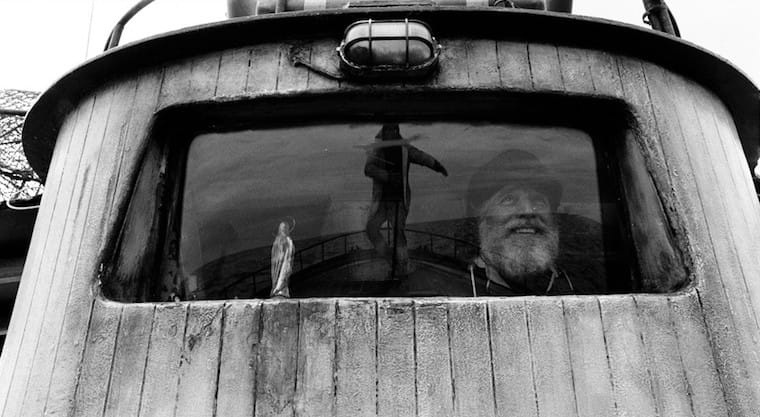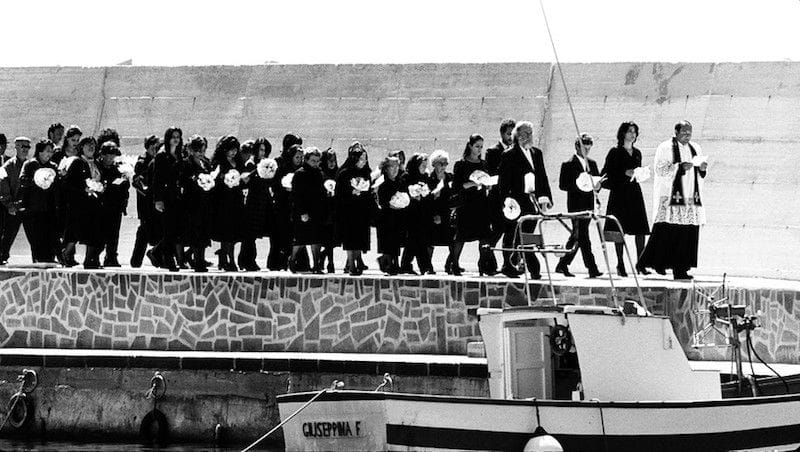In recent years the EU institutions and most member states have criminalised not only the illegal entry into the EU territory, but also citizens' human solidarity with irregular migrants and asylum seekers. This overextension of the criminal justice system, unable to discriminate the moral imperative of feeding the hungry from human trafficking networks, is wrong. It is also counterproductive because it destroys social capital: entrenching suspicion, it undermines people's potential for trust building and cooperation.
A few years ago, one scene in the Italian movie Terraferma (mainland) weighted heavy on me. When a small fishing boat encounters a raft full with exhausted immigrants, without thinking twice, Ernesto, the old fisherman, rescues them. Interrogated by the authorities who hold him liable for aiding and abetting illegal immigration and confiscate his boat, Ernesto asks a haunting question: "Do you know the law of the sea?"
The law of the sea provides an almost sacred moral imperative to rescue without a second thought or calculation people in distress at sea. But both the shadow and the reality of the sanctions given for complying with that imperative can be sufficient ground to bring second thoughts into ones' mind, with devastating consequences both for the lives of others and for one’s sense of dignity.
Unfortunately, the scene in Terraferma is not fiction but reality. And the heart of the matter is not only about the difference of the 'law of the sea' and the 'law of the land'. The examples of individuals, NGOs, and religious groups, who aid and support refugees and migrants in distress both in land and sea and who are in turn accused, threatened, formally charged and prosecuted with criminal offences have become too many to keep count (see links for examples). Many studies have documented endless examples of EU governments seeking to criminalise acts of solidarity and a constant increase in these cases (see for example Fekete 2009, Allsopp 2012, Basaran 2014 and 2015, Ryngbeck 2015, Provera 2015).
The actions of solidarity range from offering food, to offering transport, clothing, housing, education, legal aid, healthcare, rescue, and other services. Governments on the other hand have increasingly attempted to limit solidarity by prosecuting and forbidding individuals, NGOs and service providers from providing essential services to undocumented migrants, have denied state funding for services provided to undocumented migrants, and have set legal obligations to report undocumented migrants to the authorities (see Ryngbeck 2015). The irony is that these individuals and groups are prosecuted or threatened with prosecution by their governments for offering the fundamental rights and services that governments are supposed to offer but fail to do.

There are two sides to the creation of the 'crimes of solidarity', one to be worried about and one to be celebrated. In relation to the first one, the criminalisation of these acts is nothing less than a coherent pan-European project legitimated by the need for transnational governance of crime and security. It is pan-European because it is promoted through the so-called Facilitators' package composed of the 2002 Facilitation Directive 'Defining the facilitation of unauthorised entry, transit and residence', and its accompanying Framework Decision on 'Strengthening the penal framework to prevent the facilitation of unauthorised entry, transit and residence'. The package explicitly obliged EU Member States to create offences of directly or indirectly aiding the unauthorised entry, movement or residence of non-EU nationals, while it only gave the option to Member States to punish or not provision of humanitarian assistance without financial gain. According to the 2014 report of the Fundamental Rights Agency (FRA), all the Member States regulate facilitation of stay through their criminal code (with the exception of Latvia and Lithuania that consider it an administrative offence), and eight countries do not make any legal exemptions from punishment, neither for facilitation of stay that is not for profit, nor for humanitarian assistance, while a few countries have outlined some forms of exceptions, but which are deemed not sufficient (see FRA 2014).
The criminalisation of these acts is in line with a relentless expansion of the criminal law (Sklansky 2012) driven by two main rationales: instrumental and symbolic. Instrumental use means the pragmatic and strategic use of the criminal law, which is a mundane, bureaucratic and repetitive exercise of criminal powers put in motion by convenience and efficiency in delivering outcomes rather than to represent a punitive rationale to sanction morally wrong conducts (Aliverti 2012). The question asked therefore is ‘does it work’?
It works all to well, but how? The main assumption is that by harassing and deterring the volunteers and the humanitarian actions, the refugees will stop coming or will be more easily deported. But as we know from other short-sighed assumptions that have been made regarding refugees, it is absurd to imagine that the refugees will stop coming if there are no volunteers to meet and support them. Refugees will continue to come, but their lives will certainly suffer even more in the light of damaging their networks of support. Threatening supporters with prosecution leads to a struggle between obeying the law or obeying moral or other important imperatives. Some people do not comply and take huge risks on their lives, careers, and futures to do what they firmly believe and think is right, but others quite understandably simply have to, leading further to an amplification of ‘collective indifference’ (see Basaran 2015).
Besides the real effects on people and organisations, framing actions of solidarity as crimes and using the criminal law as a cunning tool for punishing these acts works also in another way. It damages and dilutes the criminal justice system and its underpinning principles, while increasing public cynicism on the hypocritical and instrumental use of the law (see Aliverti 2012, Zedner 2013). It goes without saying that criminal law should be reserved for the most serious wrongs and not for the pseudo-defense of society.
Finally the strategy also works to symbolically soothe social anxieties and pacify citizens just like babies (Neocleous 2011), by showing that states have control over immigration 'flows' at least in the domain of law and order after the retreat from social provision. One of the core functions of criminal justice according to Loic Wacquant is to check the 'social reverberations of social insecurity' (Waqcuant 2009: 305). This claim is supported by Dario Melossi's (2003) thesis that the criminalisation and penalisation of migrants and their supporters is primarily driven by moments of 'crisis' – economic, political and social. The immigrant, considered beneficial in a period of economic growth, acquires the image of the criminal during economic recession. Garland (2001) has also argued that governments increasingly resort to criminal legislation, in spite, or perhaps because of, their limited margin of action for dealing with social and economic challenges.
The West unfortunately is everything but immune to unjust laws or the wrong use of law, as its history is full of terrifying state crimes being pursued under robust legal systems. There is a danger therefore in trusting legal systems or laws with a build-in normative potential or moral potential. Once again we become aware that at the heart of the 'problem of crime' lies the power to render certain acts visible and others invisible, and to constitute certain acts as crime while keeping other beyond such framing. As Stanley Cohen has written (1988: 257) criminalisation is the process of defining an act deemed dangerous to the dominant social order and designating it in law as criminally punishable. The criminal justice system is therefore a site where social, political, economic, and racial contestation and struggles are played out rather than a set of impartial set of mechanisms delivering justice.

As mentioned in the beginning, there are sides to this story to be celebrated too. First of all, despite all the intentions to frame acts of solidarity as 'crimes of smuggling or trafficking', the framing of these crimes as 'crimes of solidarity' on behalf of scholars and civil society is the most important battle of representation vis-à-vis the state's framing. As Judith Butler has written (2004), frames regulate the affective and ethical dispositions through which phenomena are not only understood but also constituted. There are ways of framing that will bring the human into view in its frailty and precariousness, that will allow us to stand for the value and dignity of human life.
Related to this, a second thing to be deeply celebrated is the continuous and organised resistance that has been shown by the key actors. Neither courage nor deeply held moral imperatives disappear completely through the threat or reality of state punishment, on the opposite sometimes they thrive under these conditions. In 2002 the Platform for International Cooperation on Undocumented Migrants (PICUM) developed non-binding ethical guidelines for social workers, aid workers, advisors, advocates and supporters when assisting undocumented migrants, based on the principle of protecting 'the human dignity of all individuals' (PICUM 2002:1), explicitly arguing that it is legitimate to disobey laws if a state excludes its inhabitants from essential means of survival and that forbidding assistance to undocumented migrants is in conflict with fundamental ethics.
Citizens all over Europe have shown disapproval with the authority of the institutions by openly contesting and violating these criminal laws (Provera 2015:30). Similarly, Carrera and Parkin (2011) have showed that local and regional authorities have stood up to national policies in order to preserve and protect undocumented migrant's dignity and access to fundamental rights. For example in the end of 2012 the Spanish government proposed a reform of the Criminal Code to criminalise solidarity with undocumented migrants. This led to a campaign by Spanish activists called Salvemos la Hospitalidad (Let's save hospitality) which argued clearly and forcefully that a state should not interfere with humanitarian and altruistic motives and enforce rules criminalising solidarity. As a result at the end of 2013, the government amended its proposal to explicitly 'exclude criminal punishment in all cases in which the actions has been carried out with a humanitarian purpose' (Provera 2015: 32).
In another legal battle between the NGO Conference of European Churches (CEC) and the Netherlands, the European Committee of Social Rights ruled in line with the argument of the CEC that the Netherlands violates the rights of undocumented migrants breaching the European Social Charter's right to social and medical assistance and right to housing, clearly rejecting the argument claimed by the Dutch government that the European Social Charter was not applicable to the case of irregularly residing migrants. Similarly, when the Italian government challenged the region of Puglia and Tuscany for extending access to healthcare for irregular migrants beyond the minimum urgent care allowed at national level, the Constitutional Court found these claims inadmissible. In Germany, in 2011 following concerns from civil society movements, the federal legislation on 'reporting duties' was revised, exempting educational facilities and healthcare providers. In France in January 2015, when a migrants' rights activist was accused of facilitating the irregular residence of migrants he was backed by a collective of 29 associations who organised a protest outside the court chanting 'Solidarity is not a crime' (see Ryngbeck 2015). At the beginning of this year, in France more than 100 NGOs, charities and labour unions signed a manifesto calling for an end to the criminalisation of humanitarian activity.

At the European level, in March 2015, the Social Platform which consists of 48 European networks of social NGOs also launched a campaign against ‘Criminalising Solidarity’ for the revision of the Facilitation Directive. Subsequently, an in-depth study was commissioned by the European Parliament's Policy Department for Citizens' Rights and Constitutional Affairs at the request of the LIBE Committee (Civil Liberties, Justice And Home Affairs) to assess the Facilitators' Package and the way it deals with those providing humanitarian assistance to irregular migrants. Exploring the effects of the law and policy practice in several Member States, the study found significant inconsistencies, divergences and grey areas, that lead the humanitarian actors to be deterred from providing assistance, and called for a review of the legislative framework, greater legal certainty and improved data collection on the effects of the legislation (LIBE 2016), but until this point in time, there has been no revision of the Facilitators' Package, and acts of solidarity continue to be criminalised throughout Europe.
To go back to the scene of the film I started with, the metaphor of Europe as a Terraferma urges us to remember the duties of memory, hospitality, and responsibility, but above all justice.
References
Aliverti Ana (2012). Making People Criminal: The Role of the Criminal Law in Immigration Enforcement. Theoretical Criminology, 16 (4): 417–434.
Allsopp Jennifer (2012). Contesting fraternité Vulnerable migrants and the politics of protection in contemporary France. WORKING PAPER SERIES NO. 82. Refugee Studies Centre. University of Oxford
Basaran Tugba (2014). Saving Lives At Sea: Security, Law and Adverse Effects. European Journal of Migration and Law, 16 (3): 365-387.
Basaran Tugba (2015). The saved and the drowned: Governing indifference in the name of security, Security Dialogue, 6 (3).
Butler Judith (2004). Precarious life: The powers of mourning and violence. London: Verso.
Carrera Sergio and Parkin Joanna (2011). Protecting and Delivering Fundamental Rights of Irregular Migrants at Local and Regional Levels in the European Union, Research Study 14 November, Centre for European Policy Studies, 1-29. Reference link.
Cohen Stanley (1988). Against criminology. New Brunswick: Transaction Books.
Fekete Liz (2009). Europe: crimes of solidarity. Race Class, 50(4): 83-97.
FRA- European Union Agency for Fundamental Rights (2014). Criminalisation of migrants in an irregular situation and of persons engaging with them. Reference link.
Garland David (2001). The Culture of Control: Crime and Social Order in Contemporary Society. Chicago: University of Chicago Press.
Ryngbeck Annica (2015). Criminalisation of Humanitarian Assistance to Undocumented Migrants in the EU: A Study of the Concept of Solidarity. Master Thesis. Malmo University. Faculty of Culture and Society.
PICUM (2002). Ethical Guidelines for Assisting Undocumented Migrants, October, 1-6. Reference link.
Provera Mark (2015). The Criminalisation of Irregular Migration in the European Union. CEPS Paper in Liberty and Security in Europe No. 80.
LIBE (2016). Fit for purpose? The Facilitation Directive and the criminalisation of humanitarian assistance to irregular migrants. European Union.
Melossi Dario (2003). In a Peaceful Life: Migration and the Crime of Modernity in Europe/Italy. Punishment and Society, 5 (4): 371-397.
Neocleous Mark (2011). ‘A brighter and nicer new life’: Security as pacification. Social and legal studies, 20(2): 191-208.
Sklansky David (2012). Crime, Immigration, and Ad Hoc Instrumentalism. New Criminal Law Review, 15 (2).
Zedner Lucia. (2013). Is the Criminal Law only for Citizens? A Problem at the Borders of Punishment”, in Katja Franko Aas and Mary Bosworth (eds) The Borders of Punishment: Migration, Citizenship, and Social Exclusion, 40-57. Oxford: Oxford University Press.
Waqcuant Loic (2009). Punishing the poor: The neoliberal government of social insecurity. Durham and London. Duke University Press.
News and media sources
http://refugees.dk/en/focus/2016/may/human-trafficker-when-humanity-becomes-criminalized/
https://act.wemove.eu/campaigns/criminalising-humanity
http://www.irr.org.uk/news/denmark-creating-a-hostile-environment/
https://ceasefiremagazine.co.uk/author/can-simit/
http://www.irr.org.uk/news/solidarity-criminalised-an-interview-with-reem-el-awwad/
https://roarmag.org/essays/criminalizing-solidarity-movement-refugees-greece/
https://nandosigona.info/2016/03/11/crime-of-solidarity/
http://www.europarl.europa.eu/RegData/etudes/STUD/2016/536490/IPOLSTU(2016)536490EN.pdf
https://dspace.mah.se/bitstream/handle/2043/19335/2015 Ryngbeck Master.pdf;sequence=2
https://www.rsc.ox.ac.uk/files/publications/working-paper-series/wp82-contesting-fraternite-2012.pdf
Acknowledgements
Cover and inline photographs: black and white still images from Terraferma by Emanuele Crialese (2011).

